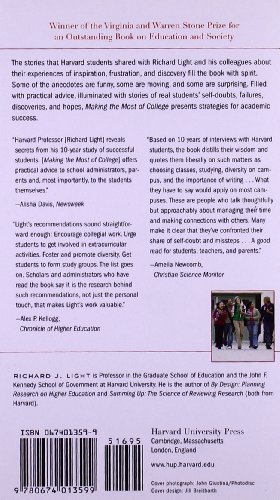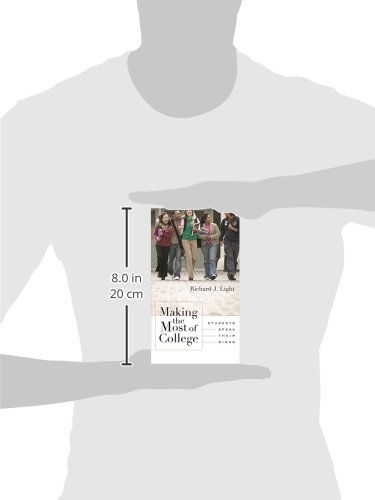



Full description not available
E**T
So you've been admitted to a top school; now what?
If you are interested in this book, check out the hard-cover edition which is available both new and used for substantially less than the paperback.I was introduced to this book by a friend who is heavily involved in undergraduate advising. I had not heard of Prof. Light or of this work previously, and I wonder whether it is less widely known than it deserves to be.The title and cover of the book are a bit misleading. It could easily be mistaken for a self-help book and/or a book that covers a wide spectrum of college environments. For this, I fault the publisher rather than the author. Readers who come to it expecting one of the above will indeed find it lacking. It assumes students are motivated and goes from there. If you're looking for a book to provide motivation, this is not it.The book in fact presents the results of ten years' research, primarily around Harvard undergraduates. To understand the context fully, one should read the first item of back matter, "The Assessment", first. There has been some attempt to generalize by involving faculty from 25 other institutions (which are neither named nor characterized), but the real focus is on Harvard.There are good reasons for this. Harvard is a very selective place, and its administration has both the wherewithal and the motivation to make every student's experience as rich as possible in the full knowledge that for every student who disengages, there were ten other equally qualified applicants for whom there was not room. Thus, Harvard funded the study, the results are particularly applicable to it, and its own press published it. It is unrealistic to carp that the book wasn't about something else.So who should be reading this book? Sadly enough, it should most be read by those Harvard faculty members who are not particularly interested in developing undergraduates to see what they're missing. Perhaps Harvard's recently-launched initiative in excellence in teaching will help; the question of advising remains murkier. Academic staff anywhere who aspire to do a better job in helping their students launch their adult lives are bound to find useful perspectives and practical nuggets. I think the book will be mostly lost on undergraduates; I wouldn't have understood it then, much as it might have been useful. Parents of high-potential college students might find it helpful in understanding what their children are going through, but to use it as a guide to advising their parentally-resistant (or, worse, parentally-dominated) offspring may be unproductive. Using it in a peer-advising context is a waste of time, as you can see from other reviews. I suspect there are good nuggets here for secondary school educators as well.This book makes an interesting contrast with the more recent book, "Excellence Without a Soul" by Harry Lewis, who was the Dean of Harvard College during the time Light was finishing this book. Lewis's book reflects personal opinions on the same issues (and more); its underpinnings are based on his own experiences rather than the extensive interviewing process Light uses. Taking the two together provides even better insights than either separately.Goodness: Among his many detailed points, Light talks (sometimes through the students) of the importance - and difficulty - of clear exposition in reporting on scientific research and of the value of evidence-based discourse, and this book provides an exemplar of both. The book is not heavy on theory with consequent bulky endnotes, and the bibliography is of reasonable size.Quibbles: Light intermixes Harvard-specific terminology (e.g., proctor) with more generic equivalents (e.g., dorm supervisor) without making the connection for the reader. He presents most of his dilemmas from the viewpoint of a student in the social sciences, which are somewhat different from those encountered by students in the humanities or - especially - the natural sciences. There is so little indentation in the extended quotes from the students that it is sometimes hard to tell whose voice is speaking. The inner margins in both the hardcover and the paperback are so tight that it's hard to read without breaking the spine. And the editing could have been a bit tighter.The above could easily reduce my rating by a star, but on balance I think the importance of the work and the clarity (if occasionally redundant) of the exposition overcome these. Perhaps I should say five stars if your desired frame of reference is a selective, research university, and four stars otherwise.
I**E
Great book to help new students prepare for realities of college
There is a lot of great info and advice from other students to incoming freshman (and also transfer students, since community college is structured quite differently from a four-year institution). Occasionally, the author wanders into a policy discussion meant for professors, advisors, and administrators. Overall, there is a lot of information here that students might not think about on their own - such as how to create good relationshiops with professors and advisors and how to find a mentor.I would especially recommend this book for any first generation college students like myself (I'm actually entering grad school, but was able to extrapolate the necessary info to my situation). If you are the first in your family to attend college, there are so many things your family cannot advise you on or even make you aware of, since they haven't experienced it for themselves. I didn't realize this until long after my undergrad program and it would have been helpful to know these things before.
K**F
A must read for college bound families
As an admission officer for a selective liberal arts college, I know I am biased about this subject, but this truly is a great book offering insights about an effective four year college education.Professor Light does an excellent job of weaving a tapestry of tales from college students about the seminal events of their collegiate experiences. Having just read the Game of Life and The Shape of the River which were primarily statistical analyses, the first hand account style was both fresh and easy to comprehend (although some empirical data would have been nice).The chapters on interaction with faculty are problably the most useful for families and prospective students, while the final chapters on diversity are most applicable to colleges themselves. Of course what other colleges have the ability to shape a diverse class like Harvard? Some of the ideas presented are great for schools who are 20-30% multi-cultural.Students and families who take the key lessons from this book to heart and utilize it when selecting a college will find an institution that will be value-added and will make a difference in the student's life.
A**R
Basics
A great read for serious students who are perhaps intimidated by the desire to make every penny of that outrageous tuition bill count. Sometimes the author gets a little too techy discussing the survey methodologies, etc., he has used to come up with his conclusions, but the anecdotes from students and the general advice are very strong. As an admissions consultant, I have recommended this book to graduating high school students as a must-do summer read.
S**N
A Must and a Good Read
It is hard to characterize this book without using cliches:A must read, should be on every college professor's bookshelf, should be required reading. But these are all true for this book. In simple terms, Light's research as summarized in this highly readable book provides the much needed substance to unite academic and student affairs in a way that will allow professors and administrators to IMPROVE STUDENT LEARNING AND COLLEGE SUCCESS.About 12-15 years ago I attended a workshop by Dr. Light and it changed my professorial life. Now as a dean, I am going to try to find a way to buy a copy of this book for every faculty member in my college.
D**H
Don't overlook the title
I think this book should be required reading for every higher education faculty member, department head or manager. You will learn things from students that you never would have thought of asking. It's a look from the student's perspective. Very informative and interesting. You will learn how to be a better teacher/advisor/mentor.
K**1
Thumbs up.
Well written.
J**S
interesting read
Purchased for a specific class, this was actually a very informative book. I'm glad the instructor required it and that I actually read it.
Trustpilot
3 weeks ago
1 day ago